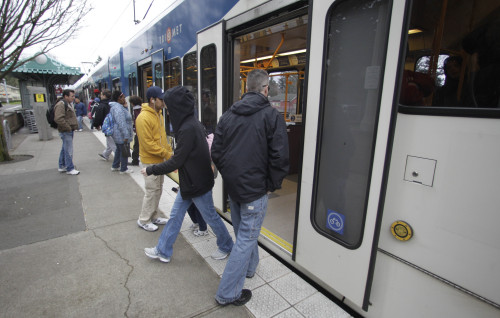PORTLAND, Oregon (AP) ― Just feet from a methadone clinic at a grimy crossroads in Portland, transit officials and police are hoping a touch of class will chase off vagrants, vandals and ne’er-do-wells that loiter near a busy transit stop.
Since November, the regional transit department has approved the playing of classical music in an effort to ward off the kind of crimes that happen when people just hang around.
A bill making its way through the Oregon Legislature would expand the program to all light rail stops in Clackamas, Washington and Multnomah counties deemed high-crime areas by police or residents.
“Classical music” in this case means opera, chamber music, choral pieces and music requiring a full orchestra. On a drizzly Wednesday morning at a pilot site in Portland, it was Bizet’s aria from Carmen, the one that rolls to a slow boil as she tells the audience she only loves those who refuse to love her back.
“L’amour! L’amour! L’amour! L’amour!” bellowed the mezzo-soprano from a speaker boxed by metal bars. On the platform, one gentleman who looked to be in his 20s, decked head to waist in bright red, looked up at the speaker, then looked away.
He boarded the train, as did the rest of the platform.
“There’s no one that just hangs around,” said Scott Nielsen, who has met the train at the stop for 18 months. Before the music “they wouldn’t get on the train, that’s how you’d know they were (loitering).”
In many ways, the station at 162nd Avenue station is an ideal proving ground for the future of “The Marriage of Figaro” and “Eine Kleine Nachtmusik” at transit stops.
The whole project was brought to Portland by police Lt. John Scruggs, a stats-happy former neighborhood sergeant who heard of the program working in other cities and thought it was worth a try.
“Here’s the thing,” he said. “It’s crime prevention through environmental design. If you put rose bushes in front of your bedroom window, the burglar is less likely to break in through that window because they don’t want to get cut up.”
 |
People board at TriMet light rail stop at 162nd Avenue on March 30 in Portland, Oregon. (AP-Yonhap News) |
To Scruggs, changing the music is changing the audio environment.
“Eighteen-to-25-year-olds are not the big ones into classical music because it’s not cool.”
Uncultured youth aside, the program has shown early signs of success, though the numbers are so small as to be statistically insignificant ― the light rail stop had all of nine reported crimes in 2010.
Scruggs wasn’t the first to think of deploying classical music.
In West Palm Beach, Florida, in the summer of 2001 police gave a similar program a chance at an abandoned building on a blighted street corner near downtown.
“You’re going way back now, you’re testing my memory,” said Dennis Crispo, the city’s assistant police chief. “I think some of the criminals got up there and destroyed our speakers. There wasn’t a lot of community support behind it.”
Indeed, the project flopped after three weeks of “Bach, Beethoven-type of stuff,” Crispo said.
“As a crime reduction strategy, it may work for a short period of time, but the criminals always adapt to police strategies,”
Crispo said. “It really doesn’t have a lasting effect.”
Not everyone’s experience has been negative. Though the police don’t monitor the effort at World Wine and Liquors in Sacramento, California, Hakim Singh said playing classical music at high volumes has sent loiterers scattering ― and kept them away for more than three years.
“You hear that?” he said, lifting his phone to a speaker that at that moment was broadcasting screeching, discordant tones of a violin. “Nobody outside.”
Crime theorists haven’t reached a consensus on whether such environmental changes actually deter crime or just push it down the block.
But Scruggs points out that transit stops are unique in that they collect a mix of people unlikely to be found grouped together anywhere else in the city.
“If you’re a person selling dope or a prostitute, you’re having people coming where you’re at,” Scruggs said. “You’re not just pushing it down the block because there’s nowhere else close by that brings your (clients).”
Scruggs didn’t pick the music, a transit department project engineer did. And that employee went with a four-song rotation that includes opera, which Scruggs abhors.
Still, it’s better than the so-called Mosquito, which has been used in the United Kingdom. It emits a high-frequency sound that causes discomfort and pain to young people but is inaudible to adults due to age-related hearing loss.
“If we create this classical music environment,” Scruggs said, “and you don’t see these loitering groups of folks, you feel safer.”
“You may not actually be safer, but you feel safer.”







![[Today’s K-pop] Blackpink’s Jennie, Lisa invited to Coachella as solo acts](http://res.heraldm.com/phpwas/restmb_idxmake.php?idx=644&simg=/content/image/2024/11/21/20241121050099_0.jpg)
